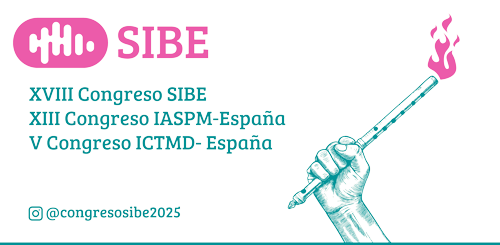
|
Sibe2025: Music and social conflict. Paradigms, approaches and challenges of contemporary ethnomusicology
6-9 Nov 2025 Barcelona (Spain)
|
KeynotesConfirmed Speakers Opening keynote Dr. Ana Flávia Miguel - Department of Communication and Arts (DeCA), University of Aveiro (UA), Institute of Ethnomusicology. Challenges of music research in times of cultural conflict and postcolonial unease In recent years, I have begun to feel what I call, in the title of this paper, a postcolonial unease. This feeling has emerged gradually, shaped both by situations I experienced myself and by those I observed in others. From the very beginning, ethnomusicologists have engaged in extensive debates that interrogate the conceptual framework of the field – among them Mantle Hood (1971), Alan Merriam (1964), John Blacking (1973), Bruno Nettl (1991, 2005), and, more recently, Timothy Rice (2014). Ethnomusicologists have also reflected deeply on how we do or practice ethnomusicology, and other “ethnomusicologies” - such as that identified by Susana Sardo (2022) - have become more visibly. The history of Ethnomusicology shows that its various protagonists have never been apathetic. While it is true that our history can evoke unease - particularly because early studies were characterized by the “gathering” or “collecting” of traditional or folk music by local scholars - it is equally true that these early efforts were followed by more academically grounded work developed by scholars from transdisciplinary backgrounds who sought to secure a place for music within the academy. The development of sound technologies, the rise of museums, and the growing interest in sound as an archival object contributed significantly to what would become ethnomusicology. Yet across these phases, music research was often imbued with salvationist ideals. Our unease persisted, as did the search for more human modes of working and more ethical ways of engaging with people. In this paper, I share some of the shadows from my own field experience - the experience of a Portuguese ethnomusicologist queering the field - and discuss how the permanent discussion on the framework of Ethnomusicology shaped a discipline that has the elasticity to change and adapt in pursuing the ideal of a discipline that has dream to contribute for a more human and peaceful world.
Ramón Pelinski Memorial Lecture Dr. Josep Martí i Pérez - Institut Català d'Antropologia (ICA) Práctica musicológica y pensamiento sutil El eje central de esta conferencia girará alrededor de la idea de que las categorías de las que nos servimos para llevar a cabo la investigación musicológica, al mismo tiempo que nos permiten aprehender en cierta manera la realidad que nos envuelve, también limitan nuestra visión. De ahí el reto de explorar posibles líneas de fuga pensando en la investigación en base a la conceptualización de la música principalmente como práctica, como actividad rizomática, des- y recategorizada, en la que se diluyen categorías con las que trabajamos habitualmente. A lo largo de la presentación, se discutirá (a) la idea de flujo, (b) el contraste entre pensamiento relacional versus pensamiento oposicional y (c) la noción de in-between o entremedio de las cosas. Esta aproximación teórica nos permite explorar nuevas dimensiones que podemos entender como propias de un pensamiento sutil musicológico.
Closing keynote Prof. Simone Krüger Bridge - Liverpool John Moores University (UK) Harmonising Conflict: Rethinking the Social Value of Choral Participation in Faith-Based Institutions In contexts of social conflict, whether imposed by a global pandemic, institutional tradition or shifting societal dynamics, musical participation emerges as a vital site of social negotiation and resilience. This keynote explores how musical participation generates social value in times of disruption, drawing on longitudinal research conducted between 2020 and 2025. Spanning the shift from digital engagement during the COVID-19 pandemic to embodied choral outreach in post-pandemic society, the research examines how choral music participation fosters educational equity, social mobility, social connection and emotional wellbeing. Focusing on cathedral-based outreach in the Liverpool City Region, the keynote considers how participatory choral practices navigate tensions between sacred and secular, tradition and inclusion, and institutional identity and public need. It argues that music’s civic role extends beyond aesthetic or liturgical function, shaping new forms of community and cultural meaning in response to structural inequality and social fragmentation. Through a critical lens on musical value, the research contributes to contemporary debates in ethnomusicology around music heritage, ritual and community participation, calling for renewed engagement with participatory music making as a site of both resilience and transformation.
|



